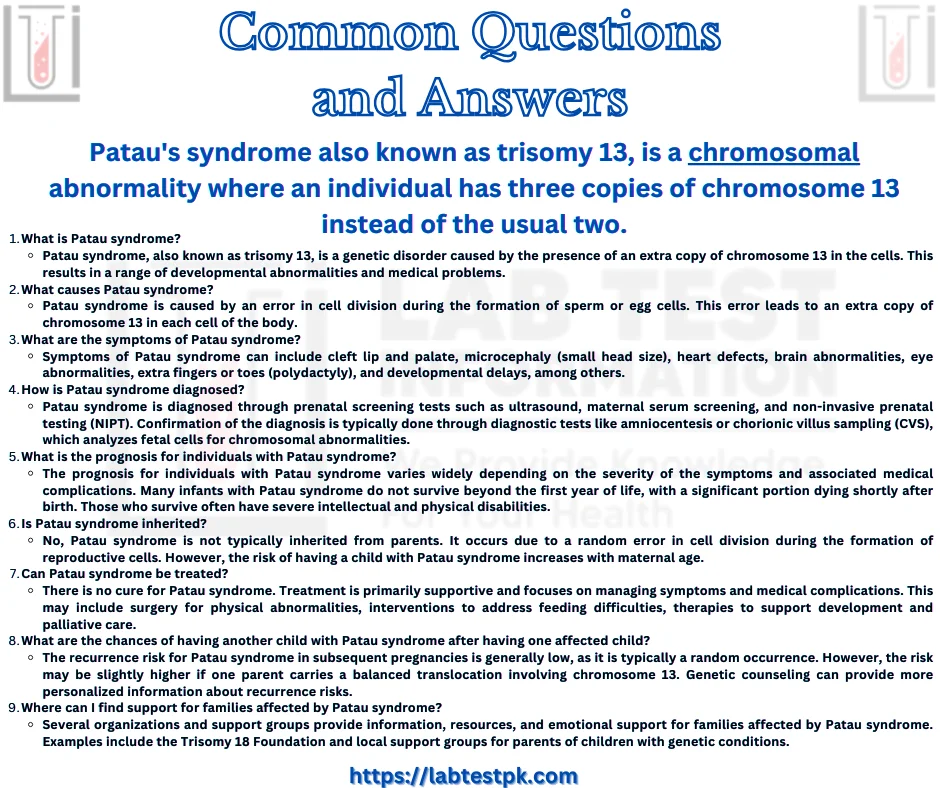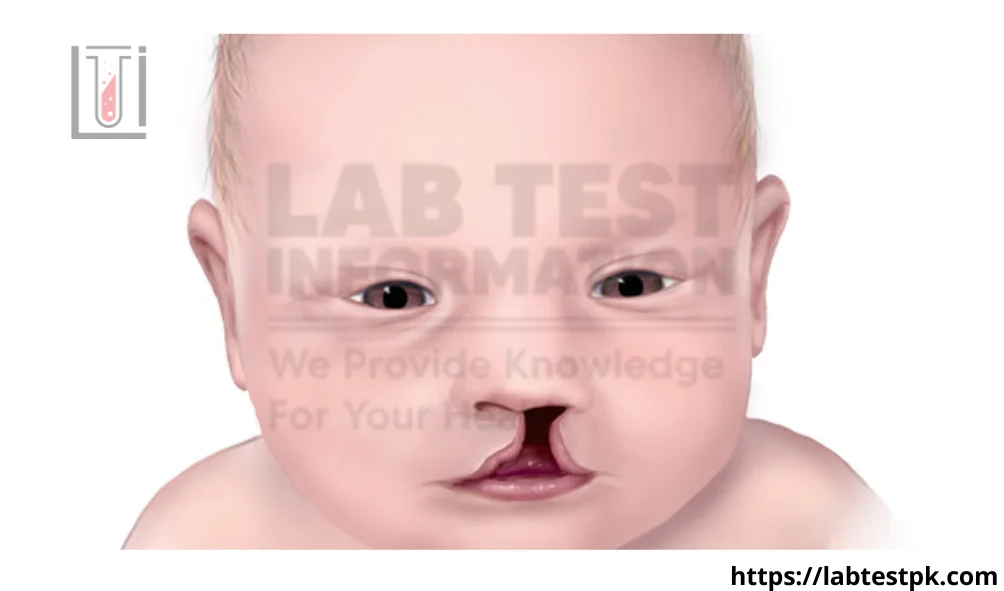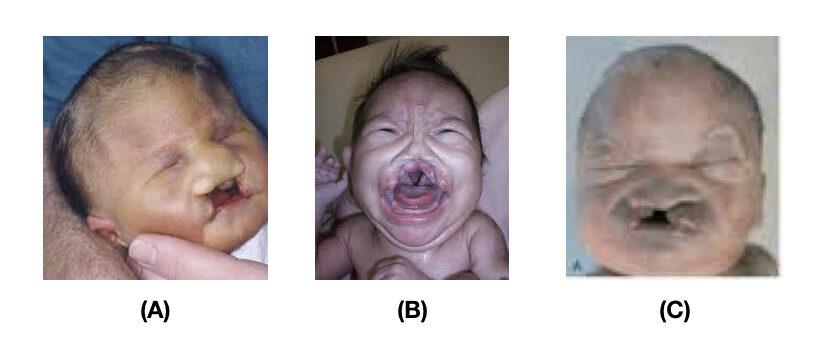Patau’s syndrome also known as trisomy 13, is a chromosomal abnormality where an individual has three copies of chromosome 13 instead of the usual two. This additional genetic material can cause severe developmental abnormalities and medical problems.
Patau’s syndrome
Symptoms of Patau syndrome:
Here are some common symptoms associated with Patau syndrome:
-
Cleft Lip and/or Palate
: A cleft lip is a split or opening in the upper lip, and a cleft palate is an opening in the roof of the mouth. -
Microcephaly
: Abnormally small head size due to improper brain development. -
Holoprosencephaly
: Failure of the brain to divide properly into distinct hemispheres. This can result in varying degrees of intellectual disability. - Facial Abnormalities: Unusual facial features, such as small eyes (microphthalmia), closely spaced eyes (hypotelorism), or a sloping forehead.
- Polydactyly: Extra fingers or toes, known as polydactyly, may be present.
- Heart Defects: Structural abnormalities in the heart, such as atrial septal defects (ASD), ventricular septal defects (VSD), or patent ductus arteriosus (PDA).
- Central Nervous System Abnormalities: Brain malformations, such as neural tube defects or abnormalities in brain structure.
- Eye Abnormalities: Small or underdeveloped eyes (microphthalmia), coloboma (a gap or cleft in the structures of the eye), or other eye abnormalities.
- Renal (Kidney) Abnormalities: Polycystic kidneys or other structural kidney abnormalities.
- Gastrointestinal Problems: Such as omphalocele (a birth defect where the intestines or other abdominal organs protrude from the belly button), esophageal atresia (a condition where the esophagus does not develop properly), or other gastrointestinal malformations.
- Feeding Difficulties: Difficulties with sucking or swallowing, often due to cleft lip and palate or other oral abnormalities.
- Seizures: Some individuals with Patau syndrome may experience seizures.
- Developmental Delays: Significant delays in reaching developmental milestones, including motor skills, speech, and cognition.
- Respiratory Problems: Respiratory distress or breathing difficulties, particularly in the newborn period.
- Low Birth Weight: Babies with Patau syndrome may be born with a lower-than-average birth weight.
Who does trisomy 13 (Patau syndrome) affect?
Patau syndrome is caused by the presence of an extra chromosome 13 in the cells. Normally, each cell in the human body contains 23 pairs of chromosomes, for a total of 46 chromosomes. In Patau syndrome, there is an extra copy of chromosome 13, resulting in a total of three copies (trisomy) of chromosome 13 instead of the usual two. Patau syndrome affects both males and females, and it can occur in pregnancies whether or not the parents have previously had a child with the condition. It’s important for pregnant women, particularly those over the age of 35, to undergo prenatal screening and testing to assess the risk of chromosomal abnormalities such as trisomy 13.
How is trisomy 13 (Patau syndrome) diagnosed?
Trisomy 13, also known as Patau syndrome, can be diagnosed through several tests, both prenatal and postnatal. Here are the main diagnostic tests used to diagnose trisomy 13:
- Chromosomal Analysis (Karyotyping):
- This is the primary method for diagnosing trisomy 13. It involves analyzing a sample of cells, usually obtained from blood, to examine the chromosomes under a microscope.
- In trisomy 13, instead of the typical 46 chromosomes, there are three copies of chromosome 13 present in each cell.
- Karyotyping can be performed prenatally through procedures like amniocentesis or chorionic villus sampling (CVS), or postnatally using a blood sample from the newborn.
- Fluorescence In Situ Hybridization (FISH):
- FISH is a molecular technique used to detect specific DNA sequences on chromosomes.
- It is often used for rapid diagnosis of trisomy 13, particularly when a quick result is needed.
- FISH can be performed on cells obtained from prenatal testing (amniocentesis or CVS) or postnatal blood samples.
- Microarray Analysis:
- Microarray analysis is a high-resolution method for detecting chromosomal abnormalities.
- It can detect gains or losses of chromosomal material, including extra copies of chromosome 13 in trisomy 13.
- Microarray analysis is often used as a follow-up test when conventional karyotyping is inconclusive or when additional information about chromosomal changes is needed.
- Cell-Free DNA Testing (cfDNA):
- Also known as non-invasive prenatal testing (NIPT), cfDNA testing analyzes cell-free fetal DNA in the mother’s blood.
- It can detect an increased amount of chromosome 13 material, indicating trisomy 13.
- While highly sensitive, cfDNA testing is considered a screening test and should be followed by confirmatory diagnostic testing if positive.
How can I reduce my risk of having a child with trisomy 13 (Patau syndrome)?
Maternal Age:
- The risk of chromosomal abnormalities, including trisomy 13, increases with maternal age, particularly for women over the age of 35.
- While the risk is higher in older mothers, it’s important to note that most babies with trisomy 13 are born to mothers under the age of 35 because younger women have more pregnancies.
Preconception Health:
- Maintaining a healthy lifestyle before conception can help optimize fertility and reduce the risk of chromosomal abnormalities.
- This includes maintaining a balanced diet, achieving a healthy weight, avoiding smoking, excessive alcohol consumption, and illicit drugs.
Prenatal Screening and Testing:
- Prenatal screening tests, such as first-trimester combined screening and maternal serum screening, can assess the risk of chromosomal abnormalities in the fetus.
- If screening tests indicate an increased risk, diagnostic tests such as amniocentesis or chorionic villus sampling (CVS) can provide a definitive diagnosis.
Genetic Counseling:
- Genetic counseling can help couples understand their risk of having a child with a chromosomal abnormality, including trisomy 13.
- Couples with a history of chromosomal abnormalities or advanced maternal age may benefit from preconception genetic counseling to discuss their options and make informed decisions.
How is trisomy 13 (Patau syndrome) treated?
-
Supportive Care
:- Supportive care is essential to address the specific needs of individuals with trisomy 13. This includes providing comfort measures, adequate nutrition, and ensuring a safe and nurturing environment.
- Many babies with trisomy 13 have difficulty feeding due to issues such as cleft lip/palate or poor muscle tone. Special feeding techniques or the use of specialized equipment, such as feeding tubes, may be necessary.
- Positioning techniques can help manage breathing difficulties or prevent complications such as aspiration pneumonia.
-
Medical Interventions
:- Some medical interventions may be necessary to address specific complications associated with trisomy 13. For example:If feasible, surgeons may consider performing surgical repairs for congenital heart defects.
- Treatment for seizures, if present, may involve anticonvulsant medications.
- Doctors may prescribe antibiotics promptly to treat infections.
- Ongoing monitoring and treatment of other medical issues, such as respiratory infections or gastrointestinal problems, are also important.
- Some medical interventions may be necessary to address specific complications associated with trisomy 13. For example:If feasible, surgeons may consider performing surgical repairs for congenital heart defects.
-
Early Intervention and Developmental Support
:- Early intervention services, including physical therapy, occupational therapy, and speech therapy, can help support developmental progress.
- These therapies focus on improving motor skills, communication abilities, and activities of daily living to enhance independence and quality of life.
-
Palliative Care and Hospice:
- In some cases where medical interventions may not significantly improve the prognosis or quality of life, palliative care or hospice care may be appropriate.
- Palliative care focuses on providing relief from symptoms and improving the quality of life for both the individual and their family.
- Hospice care provides comfort and support in the final stages of life, emphasizing dignity and comfort rather than aggressive medical interventions.
-
Family Support and Counseling:
- Families of children with trisomy 13 may benefit from psychological support, counseling, and access to support groups.
- Counseling can help families navigate complex medical decisions, cope with emotional challenges, and access resources and services for their children.
How do I take care of myself after a trisomy 13 diagnosis?
Receiving a diagnosis of trisomy 13, or Patau syndrome, for your child can be overwhelming and emotionally challenging. Here are some ways to take care of yourself after receiving such a diagnosis:
-
Seek Emotional Support:
- Allow yourself to express your emotions, whether it’s sadness, anger, fear, or grief. It’s normal to experience a range of emotions.
- Reach out to friends, family members, or a support group who can provide emotional support and understanding.
- Consider speaking with a counselor or therapist experienced in supporting parents facing a diagnosis of a genetic condition. They can help you navigate your emotions and provide coping strategies.
-
Educate Yourself:
- Learn as much as you can about trisomy 13, including its symptoms, prognosis, and available support services.
- Ask your healthcare provider to explain the diagnosis thoroughly and answer any questions you may have.
- Seek information from reliable sources such as medical professionals, reputable websites, and support organizations.
-
Take Care of Your Physical Health:
- Pay attention to your physical health by maintaining a balanced diet, staying hydrated, and getting regular exercise.
- Ensure you’re getting enough rest and sleep, as stress and emotional strain can take a toll on your physical well-being.
- Don’t neglect your own healthcare needs. Keep up with routine medical appointments and screenings.
-
Connect with Other Parents:
- Reach out to other parents who have gone through similar experiences. They can offer practical advice, share their stories, and provide invaluable support.
- Consider joining online support groups or forums for parents of children with trisomy 13. These communities can offer a sense of belonging and understanding.
-
Involve Your Partner and Family:
- Lean on your partner or other family members for support. Share your feelings and concerns with them, and work together as a team.
- Discuss your hopes, fears, and plans for the future with your partner, and make decisions together about your child’s care.
-
Take One Day at a Time:
- Try to focus on the present moment and take things one step at a time. It’s okay if you’re not ready to think about the future yet.
- Celebrate small victories and cherish the moments you have with your child.
-
Consider Spiritual or Mindfulness Practices:
- Engage in practices that bring you comfort and peace, such as meditation, prayer, or mindfulness exercises.
- Spiritual or religious beliefs can provide solace and help you find meaning in difficult circumstances.
Remember that it’s okay to ask for help and support when you need it. Taking care of yourself emotionally and physically will better equip you to care for your child and navigate the journey ahead.




[…] blood cell AChE activity is assessed in some clinical circumstances to evaluate possible hazardous exposures and track the impact of AChE […]
[…] stature and relatively poor muscle tone […]
[…] factors: Lack of exercise, smoking, excessive alcohol consumption, and inadequate sleep can contribute to chronic […]
[…] Seizures […]